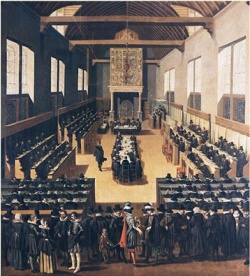 Article 5: The Inadequacy of the Law
Article 5: The Inadequacy of the Law
In this respect, what is true of the light of nature is true also of the Ten Commandments given by God through Moses specifically to the Jews. For man cannot obtain saving grace through the Decalogue, because, although it does expose the magnitude of his sin and increasingly convict him of his guilt, yet it does not offer a remedy or enable him to escape from his misery, and, indeed, weakened as it is by the flesh, leaves the offender under the curse.
___________________________________
Having dealt with the fact that the purpose of natural revelation is not to redeem but to provide a natural knowledge of God as well as to further expose fallen humanities’ sinfulness, the authors of the Canons now turn to the question of the ability of Adam’s fallen race to satisfy God’s righteous requirements as they are revealed in law.
Though it is absolutely clear from Scripture that the law is written upon the hearts of all humanity—Paul makes this point in Romans 2:14-15—it is equally important for us to take note of the fact that the Ten Commandments give concrete and explicit content to that which is implicitly revealed in natural revelation. God’s revelation of the law to Moses at Mount Sinai (which is a republication of the terms of the covenant of works God made with Adam in Eden) is God’s act in making explicit (through publication) what had been only implicit (i.e. in the human heart) in general revelation.
It has been argued by some that even after the fall, humanity can earn sufficient merit to attain a right standing before God on the basis of obedience to the law of nature (i.e. the light which God has given to all). But if the purpose of natural revelation was to give a natural knowledge of God and further expose humanities’ sinfulness, the same is certainly the true purpose of the law, only more so! The law can only condemn, not give life.
Consider the brief survey of the following texts from Romans and Galatians which address the true purpose of the law. In Romans 3:19, Paul argues that the law was given, not as a way of salvation, but in order that every mouth might be shut and the whole world held accountable to God. According to Romans 3:20, the purpose of the law is to give us a knowledge of sin. In fact, in Romans 5:20, Paul tells us that the law makes sin increase! Furthermore, the law serves to bring us under judgement (4:14) and no one will be justified by law (3:20). According to Paul, sin brought about all kinds of lust, aroused by the commandment, and says Paul, sin is dead apart from the law (7:8). It was “through the commandment” that sin deceived and brought Paul under condemnation and death (7:11). Our sinful passions work through the law (7:5) and the law is weak because of the flesh (8:3).
In Galatians, Paul says the same thing. The law never justifies people (Galatians 2:16; 3:11), because the law is sin’s strength (1 Corinthians 15:56). The law was given to lead people to Christ (Galatians 3:24); those under the law were in need of forgiveness, and Jesus Christ came as one under law in order to redeem those under the law (Galatians 4:5). As is the case with natural revelation, the law was given not as a means of salvation, but as to show us our sinfulness and need of a Savior.
According to John Murray’s helpful summary of this (Principles of Conduct, 184-186), there are a number of things the law can do and cannot do, and it might be helpful to summarize them here.
First, what the law can do:
1. Law commands and demands; it propounds what the will of God is. The law of God is the holiness of God coming to expression for the regulation of thought and conduct consonant with his holiness. We must be perfect as God is perfect; the law is that which the perfection of God dictates in order to bring about conformity with his perfection.
2. Law pronounces approval and blessing upon conformity to its demands. The commandment was ordained to life (Romans 7:10), and the man that does the things of the law will live them (Galatians 3:12). Law not only enunciates justice; it guards justice. It ensures that where there is righteousness to the full extent of its demand there will be corresponding justification and life. Only when there is deviation from its demands does any adverse judgement proceed from the law.
3. Law pronounces the judgement of condemnation upon every infraction of its precept. The law has nought but curse for any person who has once broken its sanctity; he who is guilty at one point is guilty of all. `Cursed is every one that continueth not in all things written in the book of the law to do them' (Galatians 3:10).
4. Law exposes and convicts of sin. It exposes the sin that may lie hid in the deepest recesses of the heart. The law is spiritual and as the word of God it is living and powerful, searching the thoughts and intents of the heart (cf. Romans 7:14; Hebrews 4:12). It is this discriminating and searching function of the law that Paul describes when he says `I had not known lust except the law had said, Thou shalt not covet' (Romans 7:7); the law lays bare the self-complacency that blinds us to the depravity of our hearts.
5. Law excites and incites sin to more virulent and violent transgression. Law, of itself, so far from renewing and reforming the depraved heart, only occasions more intensified and confirmed expression of its depravity. `But sin taking occasion through the commandment wrought in me all manner of lust' (Romans 7:8; cf. verses 9, 11, 13). The law, therefore, instead of relieving or relaxing our bondage to sin, intensifies and confirms that bondage. The more the light of the law shines upon and in our depraved hearts, the more the enmity of our minds is roused to opposition, and the more it is made manifest that the mind of the flesh is not subject to the law of God, neither can be.
Second, what the law as law cannot do:
1. Law can do nothing to justify the person who in any particular has violated its sanctity and come under its curse. Law, as law, has no expiatory provision; it exercises no forgiving grace; and it has no power of enablement to the fulfillment of its own demand. It knows no clemency for the remission of guilt; it provides no righteousness to meet our iniquity; it exerts no constraining power to reclaim our waywardness; it knows no mercy to melt our hearts in penitence and new obedience.
2. It can do nothing to relieve the bondage of sin; it accentuates and confirms that bondage. It is this impossibility to alleviate the bondage to sin that is particularly in view in Romans 6:14. The person who is `under law', the person upon whom only law has been brought to bear, the person whose life has been determined exclusively by the resources and potency of sin. And the more intelligently and resolutely a person commits himself to law the more abandoned becomes his slavery to sin. Hence deliverance to the bondage of sin must come from an entirely different source.
This is exactly what the authors of the Canons intend, when they declare: “For man cannot obtain saving grace through the Decalogue, because, although it does expose the magnitude of his sin and increasingly convict him of his guilt, yet it does not offer a remedy or enable him to escape from his misery, and, indeed, weakened as it is by the flesh, leaves the offender under the curse.”
The law exposes our sin and should point us to Christ!
 Wednesday, February 11, 2009 at 09:10AM
Wednesday, February 11, 2009 at 09:10AM  The Ninth in a Series of Sermons on the Book of Judges
The Ninth in a Series of Sermons on the Book of Judges










